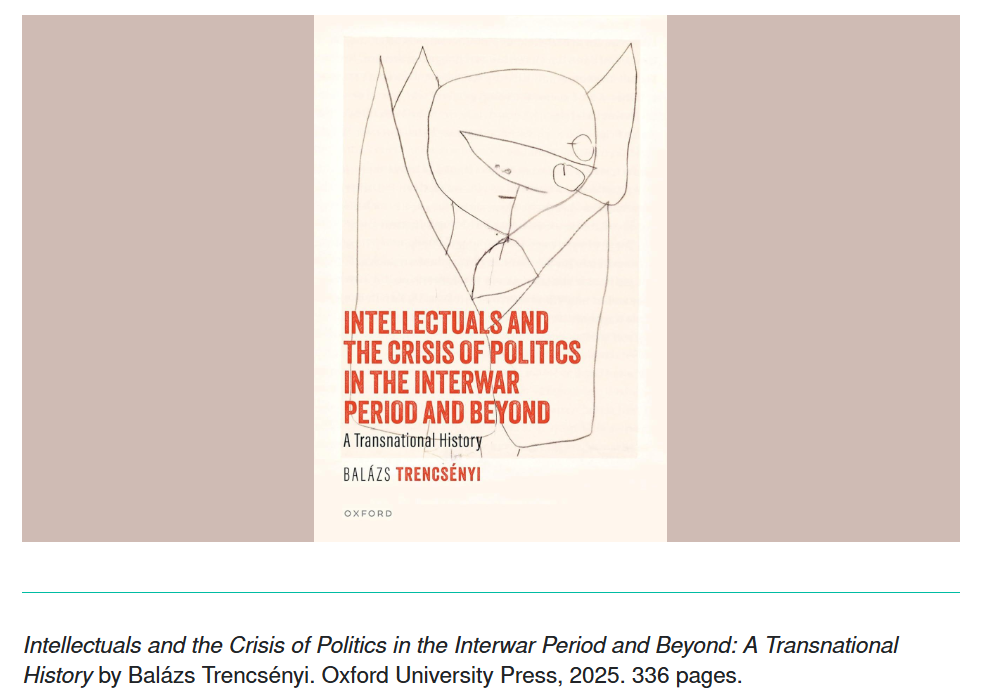In the Shadow of Yesterday [View all]
 Aurelian Craiutu thinks about Balázs Trencsényi’s “Intellectuals and the Crisis of Politics in the Interwar Period and Beyond: A Transnational History.”
https://lareviewofbooks.org/article/in-the-shadow-of-yesterday/
Aurelian Craiutu thinks about Balázs Trencsényi’s “Intellectuals and the Crisis of Politics in the Interwar Period and Beyond: A Transnational History.”
https://lareviewofbooks.org/article/in-the-shadow-of-yesterday/
NINE DECADES AGO, as dark clouds were gathering over Europe, the Dutch historian Johan Huizinga went to Brussels to speak on the crisis of Western civilization. “We are living in a demented world. And we know it,” he told the audience. “Everywhere there are doubts as to the solidity of our social structure, vague fears of the imminent future, a feeling that our civilization is on the way to ruin.” The exact context in which he uttered these words is now history, yet his message sounds eerily relevant today. We live again in a crisis-saturated world. Liberal democracy is not the only one in trouble—the environment, the economy, our education system, and our healthcare and welfare systems are as well. How are we to make sense of all these crises?
Balázs Trencsényi addresses this question in his new book
Intellectuals and The Crisis of Politics in the Interwar Period and Beyond: A Transnational History. Coming from one of Europe’s most original intellectual historians, this erudite work draws on the pathbreaking scholarship of Reinhart Koselleck and offers “an insight into what goes beyond the current diagnoses of crisis, delineating the morphology, tracing the multiple genealogies, and pondering on the present political and cultural implications of these discourses.” Trencsényi is no stranger to crisis himself. Having grown up in communist Hungary, he now teaches history at Central European University, the same university that was compelled by Hungary’s prime minister Viktor Orbán to relocate from Budapest to Vienna. He has also been actively involved in supporting Ukrainian scholars and students, forced out of their country by the Russian invasion.
Trencsényi’s book decenters the historical narratives focusing solely on developments in Western Europe and sheds light on allegedly “exotic” peripheries, thus offering a multifocal, pluralistic perspective on European history. This is a welcome development since many dilemmas of liberal democracy and crisis discourses have been felt particularly acutely in countries often seen as “marginal.” Trencsényi does an excellent job retrieving forgotten debates and highlighting links and parallels among a wide-ranging set of authors, some of whom are ignored today. As such, the book offers a novel way of thinking about European history, one that goes beyond the usual binaries of East versus West, European versus non-European, local versus global, or national versus transnational.
One of the main theses of the book is that framing an event as a “crisis” is never a neutral act. Crisis discourses are tools that can be easily abused or weaponized, depending on one’s political agenda. They have significant normative implications and may be used as cathartic mechanisms of creative destruction or, on the contrary, as means of radicalizing existing conflicts. Sometimes, crisis discourses are mere speech acts, seeking to mobilize one audience or another. At other times, they trigger challenges to political regimes. Rousseau, Marx, and Lenin interpreted the social and political crises of their respective times as omens of future revolutions. In other instances, however, crises do not involve a total breakdown of the existing regime but point out opportunities for innovation and structural reform.
snip

